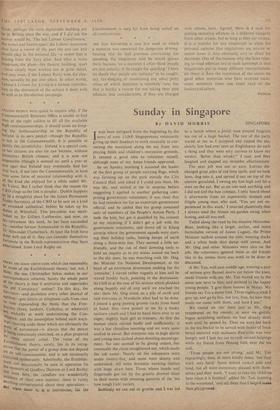T Nt RE ARE MANY carricissis which can reasonably be made
of the Establishment theory; but, not, I think. the one Christopher Sykes makes in our correspondence columns. Surely the whole point of the theory is that it overturns and supersedes the Old 'Conspiracy' notion'? To this day, the v "PP'Inror--and doubtless every other journal of opinion—gets letters or telephone calls from time to time expounding the thesis that the Free- :asnris (Jews, bankers, Catholics, or whatever)
wickedly at work undermining the Con-
ntblion; and the assumption behind such warn- ltigs--leaving aside those which are obviously the work
being consciously exercised, on a plan prepared
. LsGibe sinister cabal. The value of the '`anlishment theory, surely, lies in its recog- nition that the power of a group does not depend On its self-consciousness, and is not necessarily exercised deliberately. Admittedly, the Establish- 1:illent can occasionally be seen in operation (in b memoirs of Geoffrey Dawson or Lord Reith); it even here, the caballers are wonderfully unaware of their own motives; there is rarely anything conspiratorial about their operations-- and When there is, ii is internecine, for the
Establishment is very far from being united on all controversies.


































 Previous page
Previous page